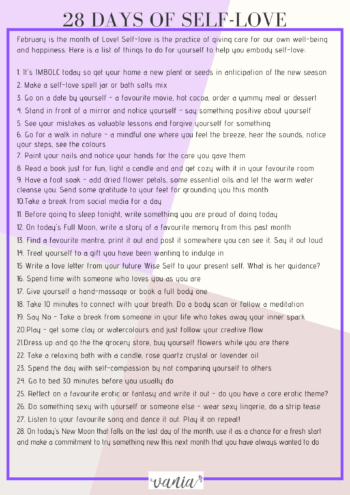This past year and a half, our physical health and wellbeing have been at the forefront of our minds. While our bodies host our health, they have not been our focus for care. So many of us have either gained weight, found comfy pants or had to come to terms with a new way of moving their bodies. And yet it’s our bodies that have helped us get through this challenging time.
We have adapted, or day i say pivoted. We found new ways to accept our softness and be less critical of ourselves. And yet i wonder if it’s just for the short-term.
I have become aware of how my self-talk mirrors my relationship to my body. After years of wearing make-up daily, this past year has been a make-up free zone. My kids don’t see me getting ready to go to work anymore, because i’m not really going anywhere. I always associated make-up with leaving the house to be in the public realm. It’s a bit of my armour, or mask if you will allow this word. I don’t miss it at all even though it was a way of making me feel like I was doing something outside the home. Now it frees me up to do other things, mainly sleeping in later.
For me, this has been a reckoning, a reclamation of my worthiness as a woman without falling prey to the story of needing adjustments to become better. I needed this shift away from listening to cultural rhetoric about what makes a ‘good woman.’
As a child of the 70s and 80s, I can remember certain stories in pop culture that reinforced the idea that thinness is ideal. That as women, we needed to aspire to this unrealistic expectation, even when it was to our own detriment. I distinctly remember an ad that told us “you can’t pinch an inch.” To be honest, i remember the phrase and image but for the life of me I don’t even remember what the ad was for. But that saying definitely stayed. So, clearly the message mattered more than the product it was advertising.
Now as a therapist who supports women with their transitions – into motherhood, middle age, or after a traumatic relationship – i guide them to connect with their body. It may not be a main goal, but it comes up time and again. Healing and repairing our relationship with our body is a main part of stepping into these new roles and phases of our life. It is our body that joins us on this ride called life. We are used to ignoring it, not having vocabulary or awareness for it. This way of holding our body with resonance is a reclamation.
I would also argue that since we have been giving birth to babies since the beginning of time, maybe this act of resilience is really just embracing what our power is, and celebrating it as we should.
Any of us who has had newborns in our life knows that our body changes postpartum in drastic ways, and isn’t ours alone. Our baby needs us, and that includes our body, so their need usually becomes the priority in order to survive. We hold them for hours to help them sleep, our nipples become raw, we feel like we can’t pee for fear of waking a sleeping babe in our arms. That leads us to feeling touched out and disembodied.
I love the word matrescence, the transition we experience when we become mothers/parents. Similar to adolescence, it’s a messy and hormonal shift and a lot of newness comes with it. So instead of mourning the bodies we have lost, it may be more productive and empowering to love what we have, and what our new bodies are capable of.
As feminism is all about choice, being comfortable and confident in our skin is one way of protesting for sure.
It’s a way of reclaiming our bodies and reminding others that our bodies are powerful – to get pregnant and birth a HUMAN from. I have been loving my Instagram feed that shows many versions of postpartum bodies being celebrated as it gives us a chance to build on our Feminine power. And yet for some many recent generations, the postpartum body has been ignored or hidden, or made to feel ugly. It’s interesting that we are noticed and touched when pregnant, but when a birther has a baby in arms, the focus and attention is all on the baby. It’s like the new mom has become invisible again, back into the shadows.
We aren’t meant to bounce back! In fact, losing the baby weight so quickly puts pressure on us, keeps our bodies sexualized, centres male privilege and consumerism (“buy these products to bounce back to your pre-baby body, and fit your jeans again!”). And it can perpetuate the norm around maiden bodies versus being a goddess or matriarch. Also, this pressure has an incredible impact on postpartum mood, relationship with partners, and self-esteem.
I also think that it’s helpful to remember that my body is my own, and it is up to me to define it, no one else. I can feel like a goddess one day, and more like a maternal healer another. I can be both/and – not stay stuck in one identity only. Feminine power and pride of growing a baby inside us should allow us the right to celebrate our body postpartum – instead of being taught to pathologize it or feel shame when we need Pelvis PT or have stretch marks. I love hearing about other countries’ ways of supporting people who have birthed by making access to physiotherapy easier for instance. As a therapist, my work around birth trauma and body image is to help my clients focus on the scar not the wound, as it is also more healing and empowering. This too is an act of reclamation.
Jessie Harrold wrote the Project Body Love: My quest to love my body and the surprising truth i found instead. In it, she shares her personal journey in reclaiming her body after having children and generally as a woman. She shares her tiny experiments of getting to learn more about herself by centring her body. For instance, asking herself what is her purpose for her body. More than taking it for granted, what it does for her, and how she can nurture it in return. This is a very intentional way of coming back to Self, and holding your body at the centre of it.
This practice of establishing a healthy relationship with our bodies is a process, one that is both necessary and sacred. If this is something you are struggling with, now that you are not alone. Here are some tips that may help:
1) Somatic Practise: This is my body
Sit comfortably and either play some soothing music or light a candle for extra comfort. With one hand, touch a part of your body and say “this is my body. This is my neck. This is my heart.” Or try “I am home here. My body is my home.” Repeat after doing it for a few rounds and see how you may feel after. This practice of
2) Reward it: Self-love for parts
It can be hard to start feeling good or positive about a part of our body that gives us grief, or we struggle with. Instead, start with a part you may be neutral or even a bit proud of already. Give it love – get a new lotion and do a self-massage of your hands, or maybe get a pedicure for your feet and all the work they do for you. Treat yourself to a new scarf for those shoulders that hold so much for you!
3) Gratitude Practice: Love letter
Have you ever thanked your body for what it does for you? It might feel triggering to do so for it in its fullness. Instead, write a letter of appreciation to the part of you that helped you through a difficult day, or hard moment. Maybe you want to draw out the moment as a way to honour your Inner Child.
Coming Back Full Circle
Now that my children have grown up a bit, they are needing my body less and less. There is still time for cuddles, hand holding, and washing hair. And yet, their bodies are growing in front of my eyes. My son is now basically the same height as me and my daughter’s shoe size is the same as mine.
My daughter has been figuring out who she is this year. And while i’m bearing witness to it, i am also an active member on the sidelines. She recently got herself a pair of ripped jeans. I had to consciously check my reactions. A part of me was worried about the attention she would get, another part was concerned why she wanted the jeans. I don’t own any ripped jeans, so this reminded me that i am not her only model now. It makes me recall this report that the American Psychological Association put forth about the sexualization of girls.
It takes a commitment to model a healthier body awareness and appreciation. My nine-year-old is definitely starting to notice her body in relation to others and also how it’s changing. Both kids are on the cusp of puberty and I’m pretty excited, if not a bit worried, about the change that is yet to happen.
In her book Mothers, Daughters and Body Image, Hillary McBride shares ways to help our children have a better body image. She shares 5 key steps: 1) Co-View – Be present with media and 2) Get in between them and the media messages 3) Teach them media literacy 4) Notice how you compliment 5) Reflect on your own comments about your body. Make sure your partner also is aware. I appreciate these tips and would also suggest i do them for myself too. It helps to get a sense of what we say to ourselves about ourselves when in the presence of social media and pop culture. There is procedural learning from our own childhood and teen years that has shaped this.
“You were never meant to play small just to make other people comfortable, and it is possible to be loved and fully you at the same time” ~ Hillary McBride
Women in the Mirror
I think there is a movement in the public arena that celebrates all bodies as beautiful because they are real. I love the saying “perfectly imperfect in every way” as it allows space for authenticity and realistic expectations. That ideal we are reaching for, doesn’t even exist – and we now know that Instagram, Facebook, and commercials use massive filters to hide ‘flaws.’ So, we can do better than looking at what is prescribed as the perfect body (skinny, tall, white, able-bodied).
Social media images like these are normalizing and work to make other women feel less alone, less ashamed of their own “imperfect” postpartum bodies. It’s not a coincidence that these campaigns come at a time when there is more work being done to address vulnerability and courage, as well as self-compassion. Brene Brown speaks volumes about the healing power of being vulnerable as it allows space to grapple with our insecurities and push them aside. Kristin Neff speaks about self-compassion, and one of my favourite principles of her work is common humanity, which is noticing we are not alone in our struggle or feelings. So when we see others in magazines or on TV that have similar bodies and scars, we can feel validated and that is so healing. It’s hard to hear the inner critic in us when we also feel ourselves in others’ bodies.
I also think it is very important to see ourselves in the media as it can lessen the impact of postpartum mood disorders, low self-worth, or the impact it has on our relationships. We are not the only ones watching – our partners are, our families, are too. This mindset shift allows us to come to a place of acceptance, body positivity and self-love. This acceptance can be the shift we need to go out to the park in the summer, to go swimming with our children in the local pool, to be present in our lives as well as our children’s instead of internalizing the negative thoughts about our bodies.
One other wonderful resource is Sonya Renee Taylor’s book My Body is not an Apology. It unpacks the intersection of colonization, white supremacy and male privilege as it relates to our body image as a society. She has since come out with a workbook, Your Body is not an Apology and this is such a great gift for reclaiming a loving relationship with our body. There is something really invigorating about being able to see yourself in others (bodies, photos, campaigns) and it speaks to how important Intersectional Feminism is in regards to representation, and where media and consumer industry has been behind the times for so long.
Our body reminds us that this stage of new parenthood is hard work. That’s why i need to take care of me (and my body) in order to keep going. As i get to the other side of parenting, my children need me differently. My body is not as used, touched and pulled in different directions as much. And yet it is exhausted, and worn to the bone in other ways. That’s why we need to keep an active practice of care for our body.
Trauma survivors have a complicated relationship with their bodies. After experiencing violation and betrayal, their bodies carry the weight of the memory. Coming to a new place of awareness, acceptance or even awe is a reparative process. This includes anyone who either experienced abuse before becoming parents, as well as people who experienced birth trauma. When we are told over and over again that birth is a natural process, when things go wrong or our bodies don’t work as they ‘should,’ a lot of that gets internalized. When we have scars (internal or visible), we feel less than our peers who birthed differently, whether a home birth, vaginally, or without a need of surgery. An unfortunate competition and hierarchy puts us into clubs right from the time we birth our babies. We internalize this comparison and it keeps us stuck in a shame spiral. We deserve better than this.
I think that a new paradigm is possible: moving away from the view that holds negative views of women and being judged by our appearance, to one that is a positive depiction of our worth and strength. I also really love the focus on our transformation after having children/giving birth to children. Instead of focusing on the ugly, why can’t we celebrate this shift. This is an active self-love movement that is growing. It’s both an act of courage and a Fuck You to show yourself to the world, flaws and all. In a world that still lives with white privilege and ableism, isn’t it an act of courage and resistance to show off our real selves?
We can be both maternal and more. We are not just mothers, even when we are. The sacrifice isn’t in our bodies or the scars we got from giving birth, but rather how others keep us from accepting our new bodies. The sacrifice comes later when we are told to hide, or feel like we can’t enjoy our life in our new bodies. The sacrifice is when we are not supported to be more than mothers, and to live more meaningful, full lives. We end up sacrificing ourselves in order to take care of babies because we were left alone in caring for them. This reclamation can be a chance to build back a community of support.
Kiss your own fingertips
and hug your own curves.
You are made of waves and honey
And spicy peppers when it is necessary.
You are a goddess,
I hope you haven’t forgotten.
~ Emory Allen
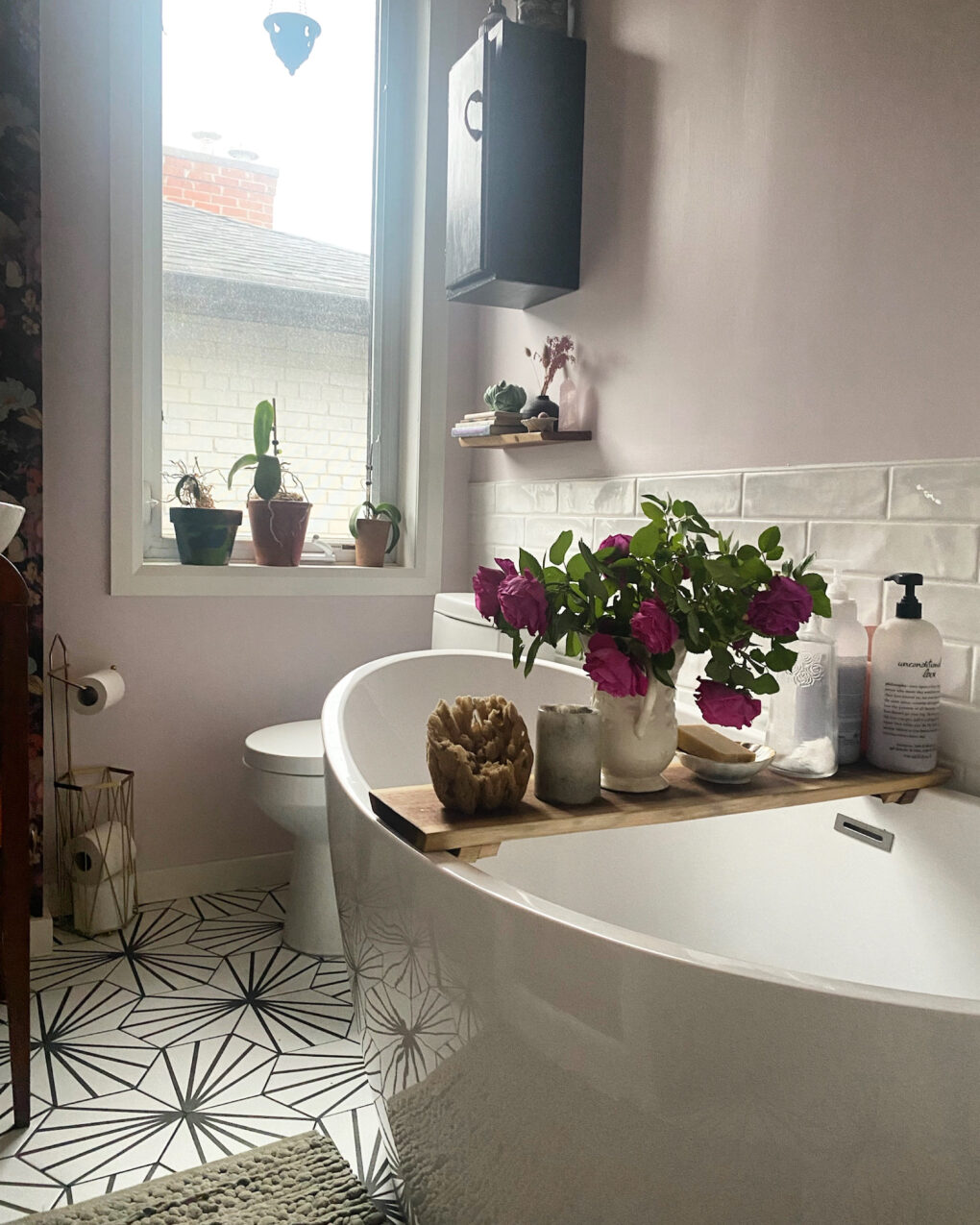

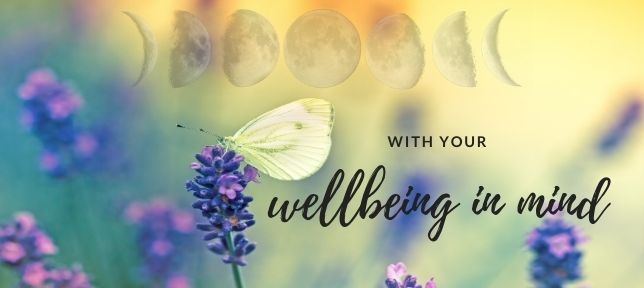
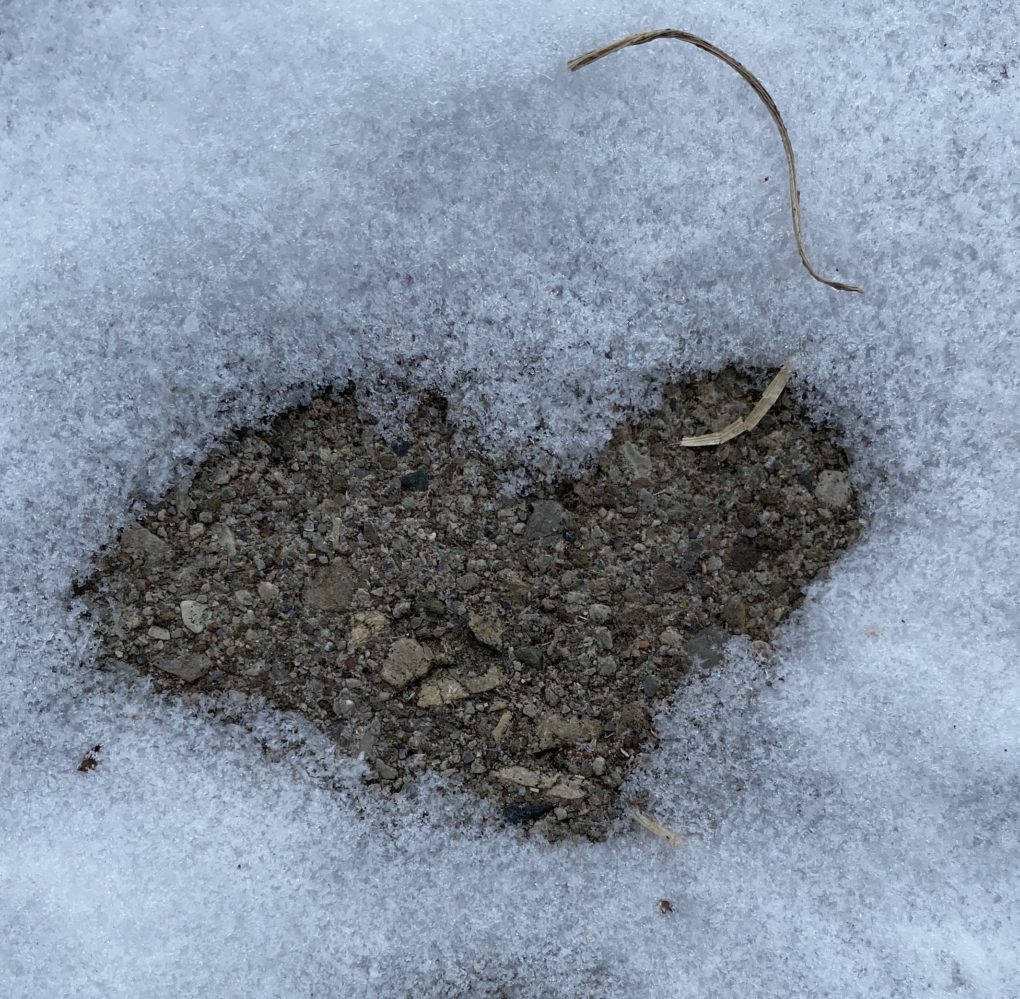
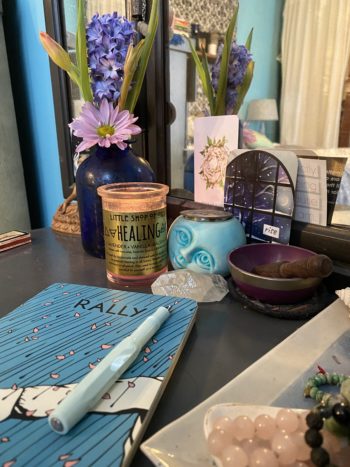
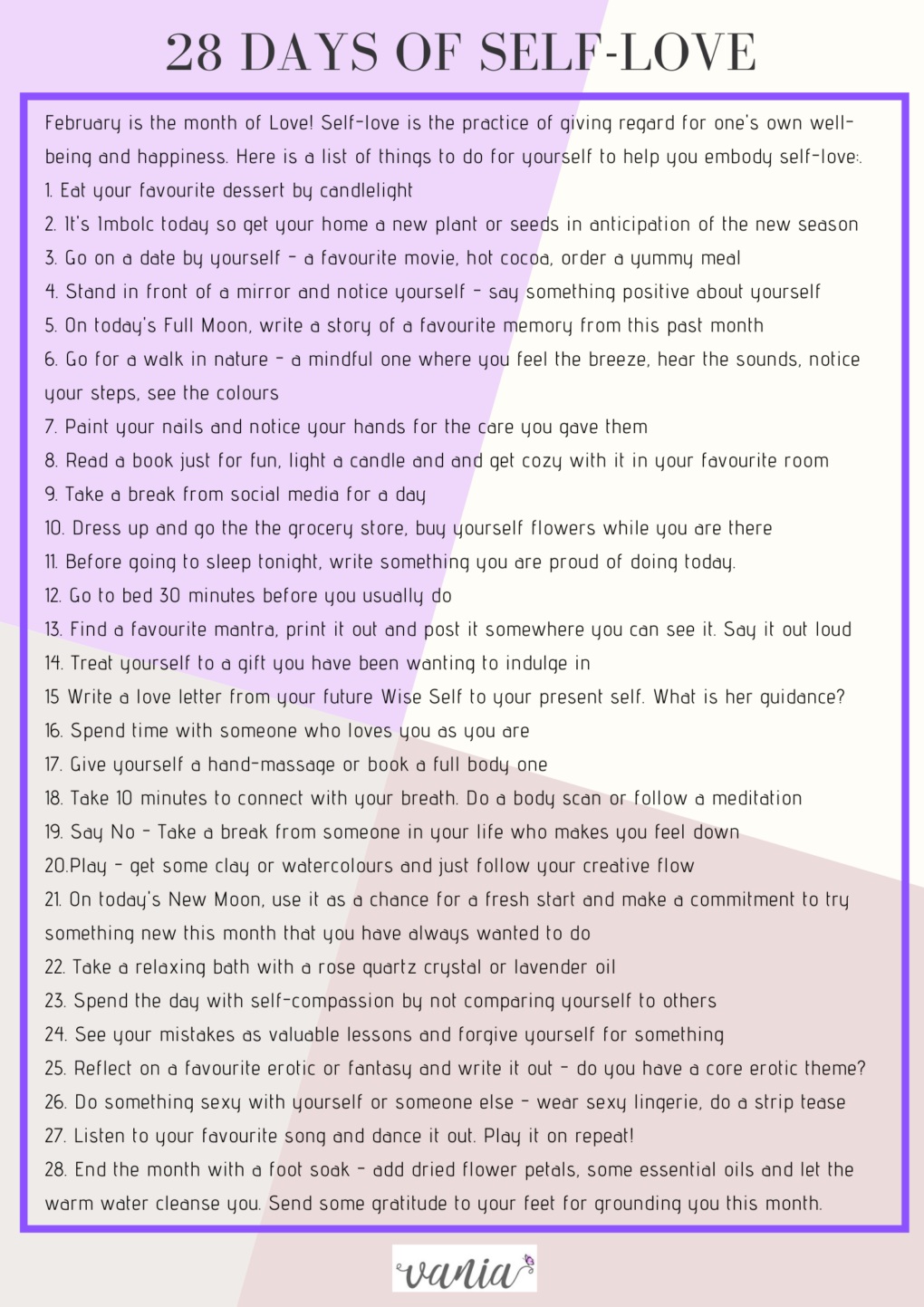 I spent some time updating my
I spent some time updating my 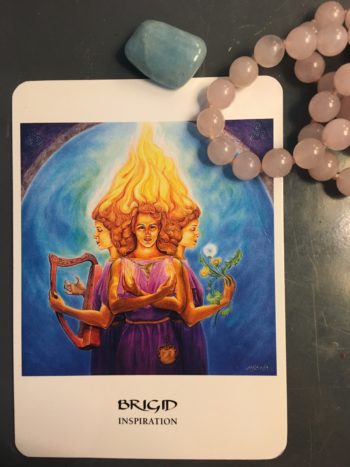 The card i pulled from my deck in January was
The card i pulled from my deck in January was 